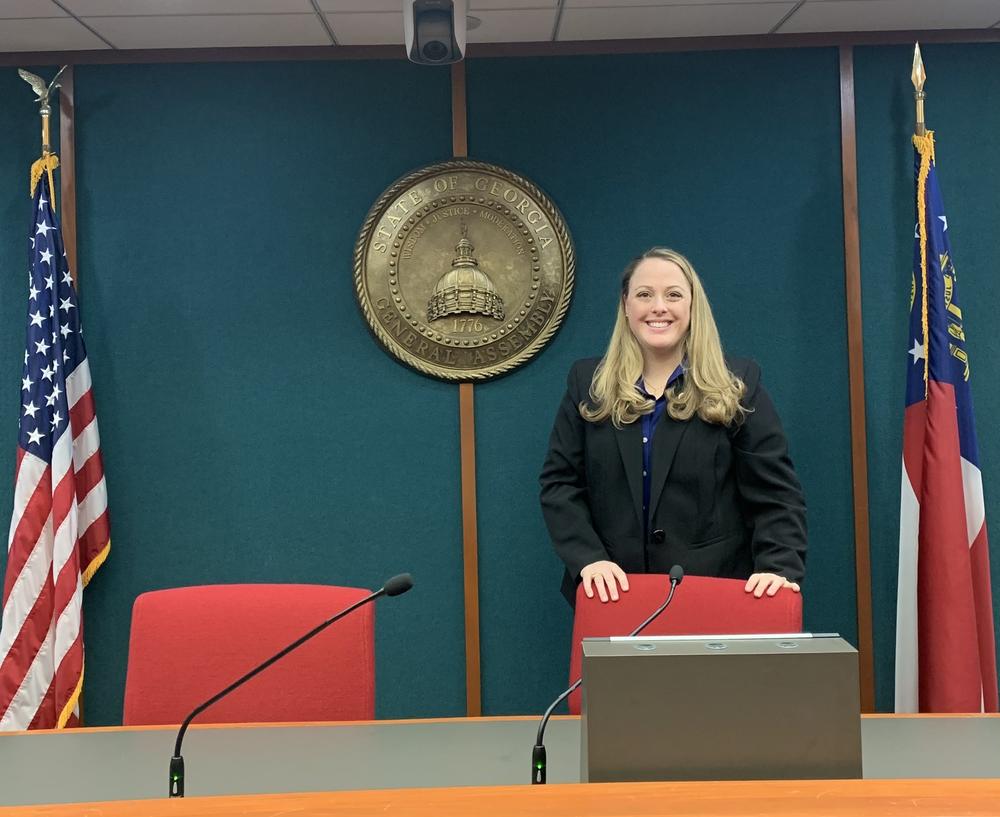
Caption
Gwinnett County police officer Ashley Wilson is advocating for legislation that would help first responders get treatment for PTSD.
Credit: Courtesy
LISTEN: GPB's Peter Biello speaks with Gwinnett County police officer Ashley Wilson, who is advocating for legislation that would help first responders get treatment for PTSD.

Gwinnett County police officer Ashley Wilson is advocating for legislation that would help first responders get treatment for PTSD.
If you’re a first responder in Georgia diagnosed with PTSD, you can get worker’s compensation, but only if you also have a corresponding physical injury. For example, if you’re a police officer shot in the line of duty and you develop PTSD, you’re covered. But if you witness another officer’s murder, you’re not. That’s what happened to Gwinnett County police officer Ashley Wilson, who struggled to get treatment for PTSD after her partner was shot and killed in 2018. She’s now lobbying for legislation that would create an insurance program for situations like hers. She spoke with GPB’s Peter Biello.
Peter Biello: This bill would help pay for therapy, which may otherwise be out-of-pocket for first responders. It also would provide three years of partial salary protection if a first responder needs time away from their job to heal. When you saw your partner killed in the line of duty in 2018, how would the aftermath have been different for you had this bill been law back then?
Ashley Wilson: I think what this bill does is recognize post-traumatic stress disorder. It takes all the stigma out of the conversation. I feel like in my scenario that I was all alone, that I didn't have — I couldn't tell anybody because everybody else looked like they were doing okay. How was I the only one who was having these flashbacks or having nightmares and not being able to sleep? And so it really kept me in that shame and guilt that I didn't share with other people. What this does is, I hope, it opens up the conversation that there is help. I think if this bill would have been around, I would have sought care a lot sooner.
Peter Biello: Could you tell us about the kind of treatment that you received after the incident?
Ashley Wilson: I was really thankful when a supervisor intervened and was like, "I know you. I recognize you. Like, this is not okay," and set me up with a really great trauma-informed therapist. Our brains are not meant to see some of the horrible stuff that first responders see every day. And so not only was I able to go through this traumatic incident, really find rock bottom and then start therapy, I was able to come out of therapy a better police officer. I was able to go back to doing this job of a guardian of my community so much better.
Peter Biello: I imagine without this benefit that you are now advocating for, it could be pretty expensive.
Ashley Wilson: At the end of my treatment, I was about $20,000 in out-of-pocket expenses.
Mm-hmm.
So this this bill would really go a long ways to helping first responders receive care and not end up having to decide: do I pay for my house or do I pay for therapy?
Peter Biello: What does this say about the mental health of police and first responders right now? Are there, in your estimation, a substantial number of these workers who are persisting in spite of intolerable mental anguish because they're afraid to bring it up or because they feel like they don't have the resources to get treatment?
Ashley Wilson: Oh, absolutely. Right now, and it has been for the past five to, really, seven years that I've done research on that, first responders are more likely to die by suicide than they are to be feloniously killed in the line of duty. I belong to a peer support team for my police department, and that really kind of gives me a behind-the-curtain view of people who are really struggling and need somebody to talk to. They need some help. They have these on the fire side, but some departments don't. Some departments don't have any resources for their first responders within the community. And unfortunately, because those resources are so, so few and far between, we see these astronomical suicide rates.
Peter Biello: You said you've gotten some pushback on this in the previous attempts to get this legislation through. What was that pushback like?
Ashley Wilson: A lot of the arguments in our first couple years of this was going through worker's compensation. Worker's compensation is kind of meant to be adversarial at times, and there's no confidentiality with it. It also — it was extremely expensive. So that's how we shifted our focus from having a worker's compensation model to having a supplemental insurance model. So we went from something that could have cost $34,000 under worker's compensation to now it'll cost about what it cost to give us a uniform per year, per first responder.
Peter Biello: Is there anything about the political winds this year that you think make this year the year it passes?
Ashley Wilson: The foundation, that House Bill 1013, the mental health and parity bill that was passed last year, sets a really great foundation for the importance of mental health. And now we've really had great support on both sides of the aisle and I think this year we're going to be able to get it through committee and to a vote on both sides.
Peter Biello: Well, Ashley Wilson, thank you so much for speaking with me about this. I really do appreciate it.
Ashley Wilson: Thank you, sir.
Peter Biello: If you or someone you know needs help, the Suicide and Crisis Lifeline is 988.